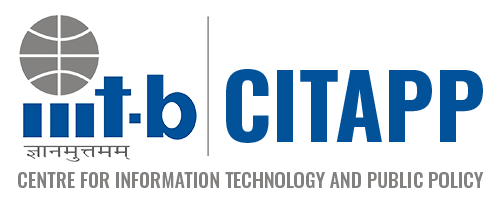Date: 12-12-2020 to 14-12-2020
Description: Online and On The Line: Democracy in the Age of Machine Intelligence
A 3-day Winter School organized by the Centre for IT and Public Policy (CITAPP), International Institute of Information Technology Bangalore (IIITB)
12th-14th December 2020
Concept
A democratic society is defined by its commitment to the ideals of liberty, equality, representation and justice. The commitment to these values is strengthened by an active citizenry and a critical media that hold the powerful accountable. In an increasingly digital world, how have these democratic values been shaped by advanced technologies that permeate our individual and collective lives? How are ideals of equality, justice, liberty and participation valued, undermined, protected, subverted, defended and strengthened?
In recent years, as intelligent machines are gradually taking over many decision-making functions in both public and private sphere, these questions around democracy and technology become even more pertinent. Be it targeted advertising, personalized recommendations, credit scoring, predictive policing or facial recognition, AI-based systems have come to shape our news, views, opinions and choices. Concerns of bias, exclusion, surveillance, polarization, and epistemic bubbles pose serious challenges for the core democratic principles of liberty, fraternity and equality in our societies.
Theme for 2020
This year’s Winter School ‘Online and On The Line: Democracy in the Age of Machine Intelligence’, will address some of these concerns by drawing on socio-technical, legal and cultural perspectives to unpack how automated intelligent systems are conceived, designed, built and used in various contexts that shape our democratic values. The winter school is aimed at developers and product designers building AI-based systems, students, researchers and professionals from engineering, law, public policy and social sciences interested in examining the implications of advanced digital technologies on the public sphere and civic participation.
Programme Structure
The 3-day winter school will consist of lectures, hands-on workshops, interactive discussions, film screenings and group activities.
The tentative topics:
•implicit bias in AI models and systems
•accountability in automated decision-making
•political communication on social media
•targeted advertising
•counter-movements
•predictive policing
At the end of the three day programme, participants will be asked to write a position paper/ blog presenting their reflections on specific case-studies that explore the implications of automated decision making on democracy. Top 3 papers/blogs will be featured on the CITAPP website.
This year’s winter school will be held completely online. The sessions will be conducted between 9 am and 5 pm every day. Click here to view the tentative schedule. Click here to view CITAPP Winter School 2020 FAQs
Applications
Anybody with a Bachelor’s degree in any discipline may apply. Students who are in the final year of their Bachelor’s degree may also apply. Working professionals employed in the government, corporate and not-for-profit sectors are also encouraged to apply. There is no application fee. Selected candidates will have to register for attending the Winter School. Registration Fee is Rs. 1000/. To apply, please fill in the application form. Applications must be submitted by 27th November 2020. Accepted candidates will be notified by 30th November 2020. The last date for accepted candidates to register and confirm their participation is December 4, 2020.
NOTE: Participants are requested to check their Spam folder for emails from winterschool2020@iiitb.org . All important communications including Zoom credentials will be shared through this email ID.
Link to the application form – https://bit.ly/3khQ81Q For further queries, please drop an email to: winterschool2020@iiitb.org

